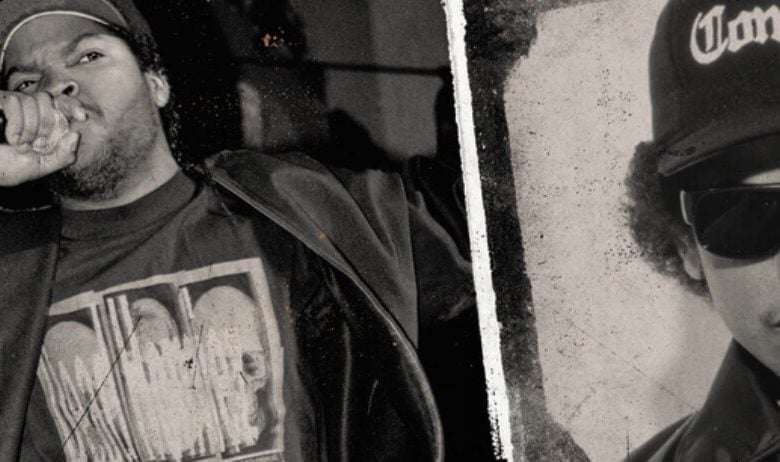‘Gangstas’ Author Reveals Rap’s Unlikely Capitalists

Ben Westhoff’s “Original Gangstas: The Untold Story of Dr. Dre, Eazy-E, Ice Cube, Tupac Shakur, and the Birth of West Coast Rap” is an exhaustive, and engaging, look at hardcore rap’s ascent. The book lets the era’s players, including Ice Cube, Dr. Dre, Snoop Dogg and the late Jerry Heller, describe how gangsta rap became one of music’s most explosive genres.
The early N.W.A. studio sessions. The feuds over money, women and turf. The attempts by government officials to stifle protest music. And how songs like “F*** Tha Police” scored a direct hit with young black males who felt the sting of police brutality.
Westhoff, an unabashed fan of the genre, spent five years researching “Gangstas.” That uncovered a trove of new material, including tragic details of rapper Eazy-E’s final days.
The N.W.A. co-founder, dying of AIDS, married his girlfriend on his deathbed and then willed his $30 million estate to her, Westhoff says. Meanwhile, fights between the different mothers of his children raged nearby. Nation of Islam bodyguards stood ready to thwart any final attacks on him.
Can We Trust You?
Westhoff says some of his sources weren’t eager to talk at first. He promised to read their quotes back to them as a show of faith. He also respected their wishes whenever they spoke off the record.

Slowly, they started opening up. The passing of time certainly helped. Events that stoked emotions 25-plus years ago could now be viewed with more patience, and less rattled nerves.
Stars like Ice Cube also learned Westhoff wasn’t there to play “gotcha” journalism.
That doesn’t mean the author skipped over some ugly chapters in gangsta rap lore. We already knew Dr. Dre has a history of hitting women. The book drills down into the musician’s past with withering results.
“Original Gangstas” features newly uncovered details about both Dr. Dre and Eazy E’s abusive treatment of women (the latter alleged, Westhoff notes).
“Dr. Dre had beaten up the mother of three of his children, including when she was pregnant,” Westhoff says. “It’s backed up with court documents, interviews and eyewitnesses.”
It’s part of a larger pattern of violence tied to gangsta rap’s formative years.
“I tried to tell the whole story,” says the author.
RELATED: Pro-Family ‘Next Cut’ Embraces Conservative Values
Through it all, Westhoff appreciated the business acumen that let these disadvantaged kids live the American dream. Consider how Eazy-E built Ruthless Records into an “insanely profitable” enterprise. Growing up in Compton circa the 1980s wasn’t easy. He established himself as a successful drug dealer before throwing it away for the chance to make music.
“He was able to make this into something that’s popular around the world, and it still resonates on so many levels,” he says of the rapper’s creative legacy.
Today’s musicians routinely speak out on social issues. Jackson Browne, Eddie Vedder and Roseanne Cash recently performed at a concert to end gun violence.
Ice Cube and co. attacked social issues with bona fide street cred in the late ’80s and early ’90s.
To them, it was personal.
They came of age at the height of the crack epidemic. Tensions between the Crips and the Bloods kept citizens on edge. Later, the L.A. riots tore the very cultural fabric enveloping the City of Angels.
“The rappers who I profile in the book came from these areas,” he says. “It gives them an authenticity … they have a real sort of personal perspective.”
That cache extends through modern times. Don’t be surprised to hear N.W.A. music blaring at the next Black Lives Matter protest, Westhoff says.
RIP Gangsta Rap?
It’s easy to say the gangsta rap era is over. Dr. Dre makes headlines these days for his shrewd corporate maneuvers, not his latest music. Ice Cube is a go-to movie star with multiple franchises including “Ride Along” and the “Barbershop” films.
Today’s teens know Ice T from his acting resume … and little else.
That misses the bigger picture, Westhoff says. Gangsta rap never truly went away.
“The themes and hard-edge of gangsta rap have taken over a huge part of hip hop,” he says, adding Kendrick Lamar may be the closest cousin to the genre.
One thing is different about today’s hip hop scene. You can say just about anything you want without fear of retribution. Politicians rarely speak out against hardcore rap as they did during N.W.A.’s heyday, Westhoff notes. “Gangstas” recalls how N.W.A. got arrested for playing “F*** Tha Police” during one concert appearance.
“Not many serious critics are questioning rappers’ rights to say the kinds of things they do,” he says.
The subjects in “Original Gangstas” are no longer wide-eyed kids dissing each other in rhyme. Ice Cube is 47. Dr. Dre is 51.
Westhoff wonders what would have happened if Ice Cube, not Tupac Shakur, had been killed during N.W.A.’s incendiary reign. Perhaps the “Friday” star would be remembered as a political prophet, not Shakur. The late rapper might have followed Cube’s family-friendly path had he lived to see his 40s.
Instead, Ice Cube emerged as a cagey business man who, as Westhoff puts it, “got tired of people being mad at him all the time.”
“He got married, started having children in the early ‘90s. It was a natural evolution,” he says.
Dr. Dre couldn’t stay gangsta forever, either.
“He wasn’t particularly fond of that lifestyle,” he says. “People loved when he portrayed himself that way. He spent time trying to distance himself from that reputation.”
Westhoff is mulling a follow-up book examining the east coast hip hop scene. For now, he’s grateful for what “Original Gangstas” allowed him to do. It meant more than interviewing his flawed but fascinating musical idols.
“It put me in touch with disadvantaged communities I might not have otherwise have visited,” Westhoff says. “It taught me some universal lessons about rags-to-riches stories … it made me appreciate how difficult it was to succeed in this way. It’s hard for anyone to do it, let alone under these dire circumstances.”
